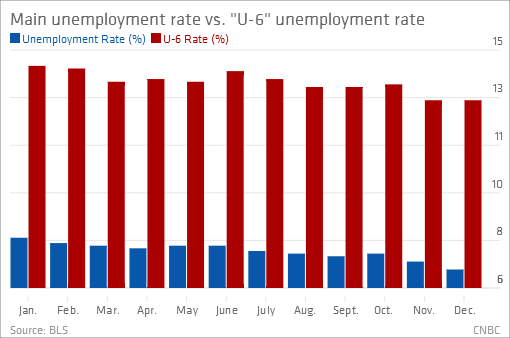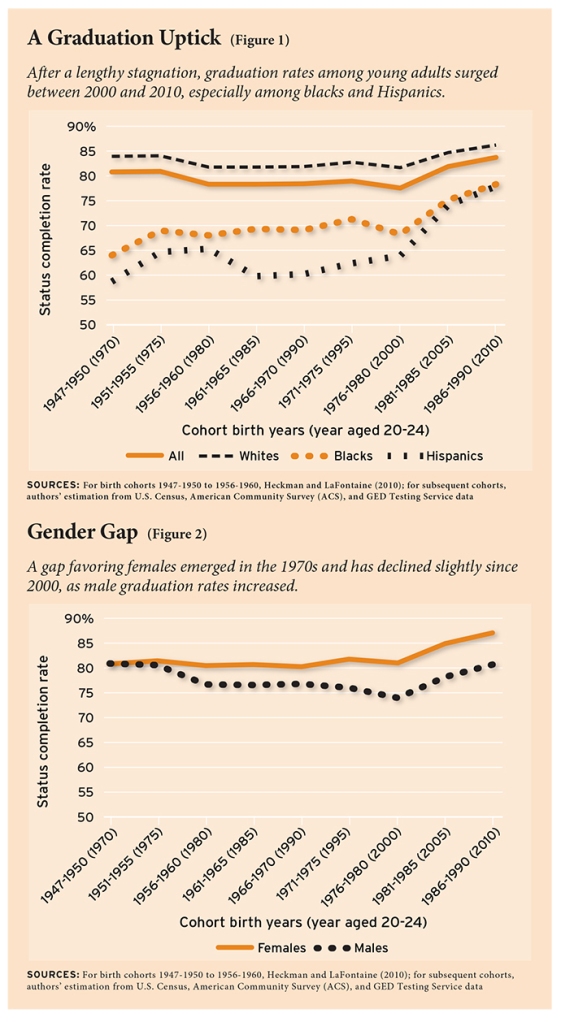President Obama was at center stage of the American political drama last night, giving us his own conception of the state of our union. And, as we might have predicted, in his mind it is “strong.” Maybe this is the equivalent of the medieval tactic of beating swords upon shields to signify strength and to intimidate foes, and if it is, the President’s sword is now more of a toothpick and his shield a bottle-cap.
On display last night was an administration bereft of coherence and in search of meaning. The Obama touches were present (references to his own past and more human interest vignettes than the cloying Olympics coverage soon commencing), but the President, perhaps more than ever, seemed both disconnected from reality on one hand, and bound by it on another.
The relentless gush of optimism was out of tune. The President claimed the lowest unemployment in five years, but few think we are in the midst of a robust recovery. CNBC ran an interesting chart, based on the Bureau of Labor Statistics, that reflects unemployment rates if we take into account the number of unemployed, those who are part-time but who are seeking full-time work, and those who are only marginally attached to the employment population.
These numbers are not so rosy. Regardless, even if we grant the President’s notion that jobs are on the uptick, two issues come to mind. First, his bar has been pretty low and he is barely clearing it. Based on his own prophecies during his first term, we should be at a full recovery by now due to government stimulus and health care reforms. Second, does anyone seriously believe the President has done much of anything to cause this “recovery?” For this President, to state a fact is to take credit for it. His shovel-ready projects were not so shovel ready. His health care reform has been a debacle, at least so far, and is constricting smaller businesses and increasing premium rates for many Americans.
The President also highlighted graduation rates as a sign of improved educational outcomes in our country. Here is a recent figure that indicates graduation rates are indeed on the rise in recent years. While the trend has been positive, variation between races and males and females persists.
There are issues, however, even with this claim. While rates have increased, college, much less high school, graduates are still greeted by a stagnant economy which only magnifies the real burden of their student debt. So, those newly minted graduates are not entering the workforce at the same rate, or in the same way, as their parents did with similar credentials.
Perhaps most critically, are increasing graduation rates resulting in higher levels of understanding, accomplishment, or skill? We can argue, through charts and statistics, about how to measure educational outcomes and the extent to which our educational levels have improved or not over time. However, I have not seen any reasonable evidence that our students are improving in meaningful ways as compared to previous decades. We do test students more and we do have nationalized standards in place. However, the incentive to “teach to the test” means that even increasing test scores do not necessarily reflect better students, but often reflect a mastery over multiple choice tests, the bluntest tool in the educational cabinet. I have been a college professor for more than a decade now, and I have not encountered anyone who believes student quality is on the rise.*
All of these things reflect the President’s disconnect with reality, but his agenda, which is “small ball” and chastened, is too bound by his political context. It is clear the President still views Congress as a shackle, especially the House Republicans. In some sense, he is correct. The GOP will not let him do as he wishes and he is in no position to change that now. However, he still refuses to engage the GOP on reform that might be mutually beneficial. The President could, if he chose, seek significant reform on Social Security and Medicare and, gulp, even his own health care plan. But, more than anything, President Obama is an ideologue. He is a true believer in the progressive vision, even at the expense of his own legacy. While a part of me admires this, after all the man has principles and he follows them, I wish he had a heavier dose of pragmatism. There are things that could be done, but to do them would require Obama to stare coldly at his left flank and ignore it. He is not prone to this, at least in economic terms.
*Granted, I may be succumbing to the Pauline Kael fallacy. Kael was a famous film critic for the New Yorker, and upon Richard Nixon’s re-election in 1972, she said in an interview, “I live in a rather special world. I only know one person who voted for Nixon. Where they are I don’t know. They’re outside my ken. But sometimes when I’m in a theater I can feel them.” It could be the people I know and associate with have no clear grasp on these things and I am treating experience as meaningful evidence, but I fail to see a meaningful connection between graduation rates and student quality.


 Bert Wheeler
Bert Wheeler
 Jeff Haymond
Jeff Haymond
 Marc Clauson
Marc Clauson
 Mark Caleb Smith
Mark Caleb Smith
 Tom Mach
Tom Mach